SIGN UP FOR THE IMPACT UPDATE
Monthly updates connecting you with people and places around the world where our missionaries make an impact.
Sign UpDivine Word Missionaries have made addressing poverty and inequality a central part of their ministry in every corner of the globe. In this resource, we highlight the ways our missionaries take up this cause. We hope this information and these stories help you understand how each of us can help work to eliminate the tragedy of material and spiritual poverty.
As Christians, our call to serve the poor is made crystal clear in the words of Scripture. This resource explores how we are responding to that call.
Poverty is fundamentally about scarcity — a lack of life’s basic human goods and needs: food, shelter, clean water, social support, economic resources, education, opportunity to grow and flourish.
We often reduce poverty to simplistic economic terms, but poverty is both material and spiritual. No attempt to address the impact of poverty can succeed without a holistic sense of what makes a person, a family or a community thrive and what societal measures bring more dignity and more peace to the lives of the impoverished.
In our Catholic missionary service around the world, Divine Word Missionaries are working to provide for people’s basic needs; treat the impoverished and suffering with love; and lift them out of poverty through education, support and opportunity.
being socially marginalized, watching your family suffer, lacking social or cultural power or representation, feeling helpless and trapped by poverty.
feeling the pangs of hunger, getting sick but not being able to go to the doctor, sleeping on the streets or in garbage dumps, drinking unclean water.
not being able to read, not having access to a school, not knowing how to get to resources that could help you, not knowing what your tomorrow will look like.
making less than a living wage, struggling to find work, being shut out from work opportunities because of discrimination or lack of education.
fear for your family, fear for the future, fear of instability, fear about survival.
It can be easy to lose sight of the human face of poverty when we focus on statistics and facts, but it’s also valuable to get a numerical sense for the state of poverty in the world today. The good news is that world poverty rates have been declining steadily over the last few decades.
Here’s a look at some recent statistics and facts about the state of global poverty.
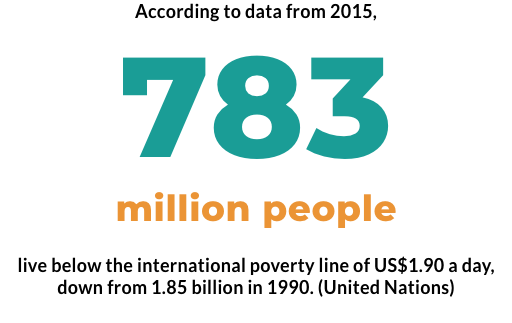
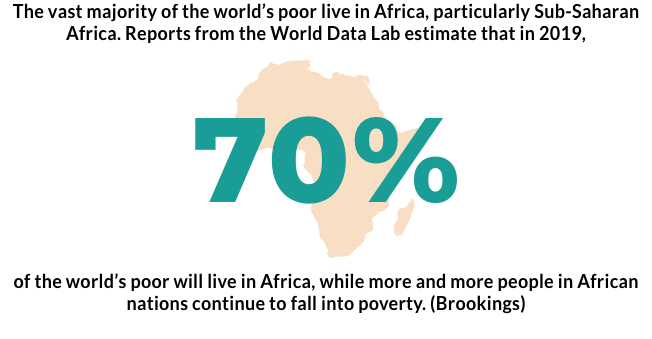
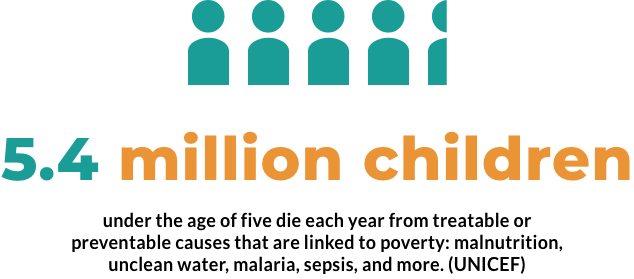
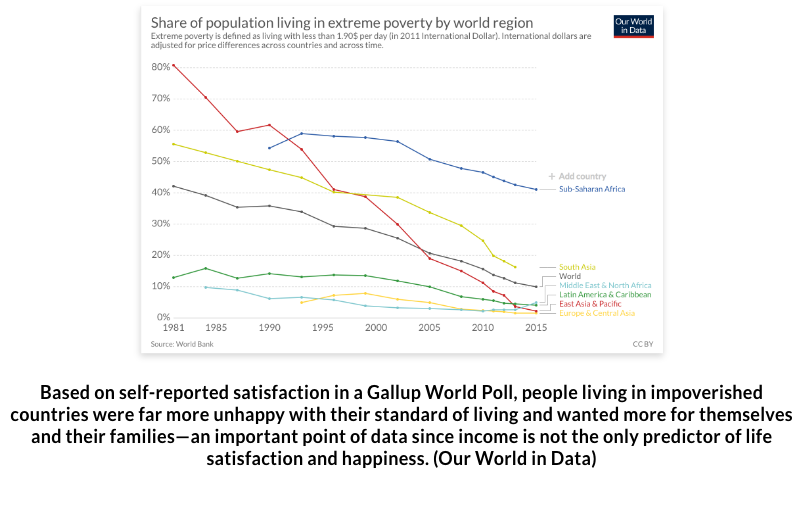
The poverty level (or poverty threshold) is a numerical income marker used to differentiate between people who live in poverty and people who do not. While this may sound arbitrary, the threshold is selected based on input from many economic factors and is used by governments to create policies and programs targeted to those who need them most.
The poverty level differs from country to country and is typically established by the government of the country in conjunction with experts in other organizations.
Most places around the world also distinguish between those who live in poverty and those who live in “absolute” or “extreme” poverty.
Globally, the World Bank defines the extreme poverty threshold as people who live on less than $1.90 per day.
Monthly updates connecting you with people and places around the world where our missionaries make an impact.
Sign UpPoverty is difficult to discuss because in many cases what would be considered poverty in a wealthy, developed country would be considered tremendous luxury in many other parts of the world. Because of this disparity, experts have introduced the idea of relative poverty versus absolute poverty.
Relative poverty is conditional: it is evaluated based on the average income and living conditions of a specific country. Absolute poverty is universal: it is a condition of living where people are unable to provide such basic necessities as food, shelter or clothing for themselves. While even the wealthiest of countries may have some people who live in absolute poverty, absolute poverty is much more common in Central America. In large parts of Africa and Asia, however, absolute poverty has been on the decline for the last several decades.
Our missionary efforts in 80-plus countries around the world are mostly focused on serving people living in absolute poverty.
Our feeding programs, medical centers, and shelters attempt to help people get the basic necessities they need to survive.
Our lessons in sustainable agriculture, microloan programs, and educational opportunities attempt to help people breakout of the misery of crushing poverty and into more stable living conditions with economic potential.
Wherever Divine Word Missionaries are serving, they can be found working with the poorest and most marginalized groups. In many cases our missionaries work within a parish community and draw on volunteers and resources in the local community in order to make positive changes in the lives of the impoverished.
“There’s two kinds of poverty. We have the poverty of material; for example, in some places like in India, Ethiopia and other places, where the people are hungry for a loaf of bread – real hunger. But there is a much deeper, much greater hunger; and that is the hunger for love, and that terrible loneliness and being unwanted, unloved – being abandoned by everybody.”
— St. Teresa of Calcutta
When you serve as a missionary, your job is not simply to offer people help or resources. You are called to address the spiritual needs you encounter. For many people who are suffering from poverty, the greatest gift you can offer them is kindness, respect and concern for their heart and soul, not just their physical well-being.
One early Divine Word Missionary, St. Joseph Freinademetz, once said that the missionary is not the Light but someone who reflects the Light. When our missionaries move among the poor, they are called to reflect the love of Christ, bringing charity and dignity to people who are hungry for love.
Divine Word Missionaries are actively engaged in providing for the basic needs of impoverished and marginalized people, such as the need for food and for shelter.
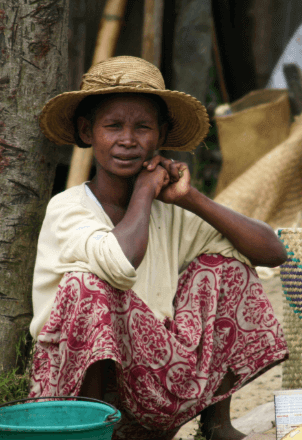
In 2014, Fr. Anthony Amissah SVD started a weekly feeding program through his Divine Word parish in an attempt to support the street children and elderly of Kayole, Kenya who live lives of desperate poverty.
The feeding program’s goal is to meet the material needs of the young and elderly while treating them with great dignity and fostering hope. The ages of the participants of this weekly feeding program range from 6 to 98. Many of the people who are served food are suffering from physical ailments. They live in homes made from cardboard boxes with leaking rooftops and dirt floors, with old and young sleeping on old rags.
But every Saturday, between 160 and 180 street children, homeless families, and elderly people come to the church compound to eat a healthy, balanced meal. They know that they are safe with us and they feel loved and wanted.
The whole Catholic parish community works together to support this feeding program.
Finding effective, culturally relevant ways to improve a community’s ability to provide for itself is the great task of all organizations who want to help lift people out of poverty. Divine Word Missionaries have had great success by starting things like sustainable agriculture programs and microloan programs.
Our sustainable agriculture efforts typically include identifying the best cultivation practices for a specific area of land and then teaching local farmers better ways to raise crops and livestock, improving their ability to sustain themselves and not fall into destitution.
Our microloan programs offer small investments to people with little income who are interested in starting a small business to support themselves. In addition to the initial investment, our missionaries and local volunteers coach people through the launch of their business, teaching them how to keep their books and handle other administrative and bureaucratic tasks.
Divine Word Missionaries work to empower all impoverished families and communities by offering access to training and resources that can help them work toward greater stability and dignity.
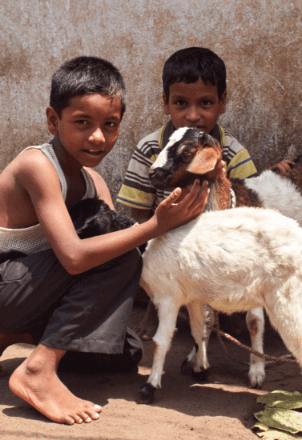
In the slums of the central Indian city of Indore even the youngest children have to work.
A 9-year-old girl named Puja is one of these children. Labor in the brickyards has left her hands dry and cracked. Every morning Puja and her grandmother get up very early . After a few quick bites of breakfast, the old woman and the girl set off for the brickworks at first light. Work starts at about four in the morning.
In this area of Indore, Divine Word Missionaries are making it possible for children like Puja to get their first steps in education through “bridge schools.” To assist older residents, microloans are available to help them start small businesses. Bridge schools and microloans will break young and old free of the cycle of poverty and liberate them from a lifetime of demeaning jobs and living in squalor.
Skilled medical care is one of the most difficult things to access when you are living in poverty, and many of the poor are suffering from malnutrition, high rates of HIV/AIDS and other types of preventable and treatable diseases and conditions.
One of our key priorities in our work around the globe is to provide adequate medical care to vulnerable populations like the poor, the HIV-infected and orphaned children. Many of our parishes and schools offer basic medical centers, and some missionaries run homes and centers designated for long-term medical care for HIV or leprosy patients.
In countries where HIV and leprosy can get you turned away from a traditional hospital, our medical centers are saving lives and healing spirits.
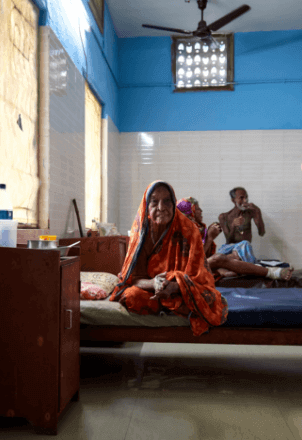
Located in Puri in the Indian state of Odisha, the Karunalaya Leprosy Care Centre was founded in 1975 by the late Father Marian Zelazek SVD to provide clean housing, food, education, healthcare and social integration to people who to this day are considered “untouchables.”
As the Indian government has closed many of its leprosy centers, ours remains the only one in the vicinity dedicated to and specializing in the care of leprosy patients, now providing housing to 1,000 people. The centerpiece of our healthcare mission at Karunalaya is the 22-bed, short-stay hospital where leprosy patients can be admitted for treatment. Because many of our patients are not accepted at other hospitals, they can also find care for general illnesses here.
Besides medicines for leprosy, we also supply the more common medicines: antibiotics, cough syrup, vitamin tablets and painkillers. We also stock baby food for infants in our care. No hospital is complete without a laboratory. Here, pathology work and tests to detect disease are constantly in demand. Our bandaging and dressing room is always busy as well.
Fr. Marian began a mission of solidarity with the most outcast and vulnerable people of India. Today, we proudly carry on and grow his mission, fighting the battle against this dreaded disease and the stigma it carries.
Cultures may differ, but a good human story is universal. Subscribe to our blog today to hear from missionaries in the field.
SubscribeBecause Divine Word Missionaries are present in more than 80 countries around the world, especially in developing countries with little infrastructure or resources, our missionaries are often on the front lines of natural disasters and the disaster of human conflict.
In the wake of such natural disasters as earthquakes or flooding, the international media is full of stories and pictures for a few days at most. Then the rest of the world moves on and forgets about the lives that have been destroyed or taken by these acts of nature.
In disaster situations, our whole Divine Word Missionary family rallies to support the people who have been affected and the missionaries who are serving them by sending in financial contributions, prayers and other resources.
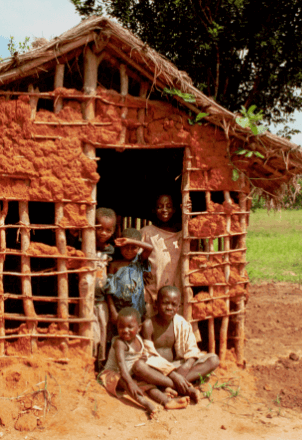
On March 14, 2019, the intense Cyclone Idai made landfall in Mozambique, right near Beira, a port city of 500,000 people. Over the next few days, this storm dumped catastrophic amounts of water on the area, causing widespread flooding, death and devastation. Some aid agencies have estimated that 90 percent of the area was destroyed.
Flattened homes, impassable roads, no electricity, families separated, food and medical shortages — it's difficult to capture the immensity of the crisis in Mozambique and other surrounding countries in southeastern Africa caused by Idai.
Current estimates put the fatalities at over 1,000, and many people engaged in relief work think this number is far lower than the reality of those who have been lost.
Our missionaries have already distributed food items for approximately 500 people. They are now gathering more resources to help even more individuals.
The Divine Word parish community of São Francisco Xavier in Beira formed a volunteer team called “Activists of Charity” with 12 volunteers from six communities. The team reviews and assesses the needs in the communities to identify destitute people such as widows, the abandoned, the sick and the elderly who have no one to help them.
We hope you have enjoyed learning more about the realities of poverty and the work that Divine Word Missionaries are doing to tackle the challenge of poverty.
We all know that the challenge of poverty can be intimidating. There are so many people who are suffering in inhumane living conditions. But we also know that we are called to be a part of the solution.
When people have access to basic needs — food, medical care, shelter — they have the opportunity to thrive and grow into the people they are created to be. Our brothers and sisters in poverty need our empathy and material support.
Join Mission Impact and support the work of Divine Word Missionaries for the hungry, the homeless, the suffering and the marginalized.
Want to connect with us and stay up-to-date on stories from the mission field?